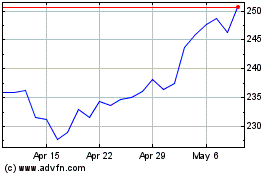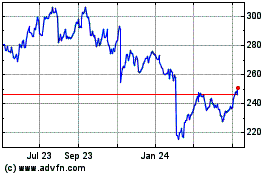UPDATE: Corporate Bond Issuance Fizzles As Euro Doubts Return
October 31 2011 - 5:07PM
Dow Jones News
A shift in overnight sentiment and waning confidence in the
European rescue plan have dashed hopes for a sudden pick-up in
corporate bond supply, even as demand from investors and flows into
bond funds are increasing.
A strong pipeline of bonds was expected this week and through
November after optimism over a resolution of Europe's debt crisis
triggered a $17.8 billion burst of investment-grade deals in the
U.S. last week. On Thursday alone--the day after investors agreed
to take a voluntary 50% write-down on Greek sovereign
debt--companies sold $13.7 billion of bonds in the U.S., the most
in a day since March 22, according to data provider Dealogic.
But the rally failed to materialize Monday, with one measure of
the U.S. corporate bond market's health--the CDX Markit North
America Investment-Grade Index--deteriorating 4% from Friday's
closing levels.
"You will see some borrowers push forward, but those who saw
opportunistic pricing last week and had been planning to come to
market may not come this week," said Andrew Karp, managing director
and head of investment-grade debt syndicate for the Americas at
Bank of America Merrill Lynch.
Last week's spike in issuance lifted the month-to-date total of
investment-grade bonds to $44.7 billion, but that is still well
behind the same month last year, when companies issued $58.3
billion of bonds.
One of two borrowers marketing high-grade deals Monday was Ruby
Pipeline LLC, a joint venture owned by El Paso Corp. (EP) and
Global Infrastructure Partners LLC. The $1.075 billion senior
unsecured bond offering, which is expected to price this week, and
a separate interim credit facility will help its owners refinance
an existing loan used to put the pipeline in service in July.
The second company to brave the U.S. market with a high-grade
bond was Air Products & Chemicals Inc. (APD), which intends to
use proceeds from its 10-year, $400 million deal for general
corporate purposes, a company spokeswoman said. The deal was
increased from a planned $300 million, and priced with a risk
premium of 0.82 percentage point over comparable U.S. government
debt to yield 3.007%.
Other corporate borrowers seem eager to wait out the headline
risks stemming from this week's economic data reports and policy
meetings by the Federal Open Market Committee, G-20 and European
Central Bank, syndicate managers said.
That's despite a huge imbalance in supply and demand as
diminished issuance collided with the fact that investors have
stashed a record high $704.1 billion into intermediate-term
investment-grade corporate bond funds as of the end of September,
according to Lipper, a unit of Thomson Reuters.
Together, this has provided for the most favorable borrowing
conditions for companies in weeks--although buyers have been
subject to big swings in the value of their holdings.
"There's plenty of demand, it's just that it's fleeting," said
Michael Collins, senior investment manager at Prudential Investment
Management. "Investors have to have a strong stomach, because
spreads are jumping around right now."
The average yield an investor can earn on an investment-grade
corporate bond is 3.7%, the lowest it has been all month, and
companies themselves are paying just 2 percentage points in
interest over what the U.S. government pays on comparable debt,
according to Barclays Capital index data. On Oct. 5, the average
yield for high-grade corporate debt was 4% and companies paid 2.5
percentage points over Treasurys on average.
Conditions for non-investment-grade or "junk" rated borrowers
are even more compelling, with yields falling 2% to 8.1% over the
same period, and the price of the average bond rising to 99 cents
on the dollar from 91 cents in early October.
"Generally, things feel a lot better" for corporate borrowers
said Karp. "The calendar [of new bond sales] has been very light
and investors have been defensive so there is cash built up."
The risk for investors is whether the situation in Europe or
other news will bring about too much volatility for what are
traditionally conservative corporate bonds. That has led bond
buyers to scrutinize the performance of recently issued bonds
before putting their stockpiled cash to work.
The news has not all been good. Some recent deals were little
changed as of last week, but others are showing signs of weakness
in secondary trading, according to MarketAxess data.
Verizon Communications Inc. (VZ) sold $1.85 billion of 10-year
debt and $750 million of 30-year bonds under a four-part deal
Thursday. As of Monday mid-afternoon, the 10-year notes were
trading with a risk premium of 1.23 percentage points over U.S.
Treasurys, up from 1.2 originally, while the risk premium on the
30-year bonds widened to 1.41 percentage point over Treasurys from
1.375 percentage point on the day of pricing.
Similarly, a $1.35 billion tranche of three-year debt from IBM
Corp. (IBM) priced at 0.40 percentage point over Treasurys on
Thursday, but is now trading with a risk spread of 0.42. When risk
premiums rise, the value of the bond falls.
If deal performance spooks investors, some companies may choose
to bring deals next year instead of pushing to come in before
Thanksgiving kicks off the traditionally slow holiday season. Or
they will crowd the market on a day when the outlook seems
rosy.
"It's hit or miss--when there are good days, the issuers come
out of the woodwork and they issue what they can," said Collins.
"You may have it all shoved into a few good days when the market is
strong."
-By Katy Burne, Dow Jones Newswires; 212-416-3084;
katy.burne@dowjones.com
Air Products and Chemicals (NYSE:APD)
Historical Stock Chart
From Jun 2024 to Jul 2024

Air Products and Chemicals (NYSE:APD)
Historical Stock Chart
From Jul 2023 to Jul 2024
